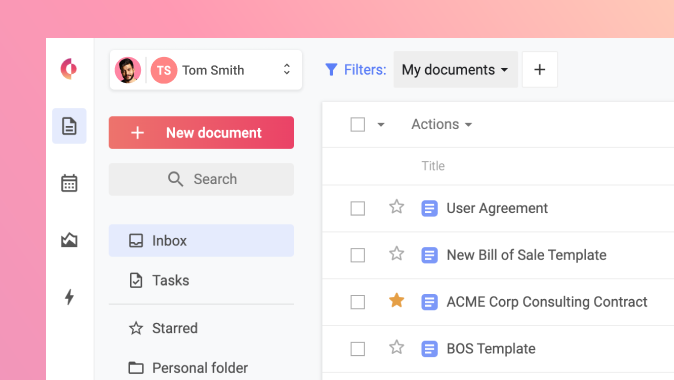Contract Manager: Key Responsibilities and Skills
Table of contents
- What is a contract manager?
- Contract manager job description
- What are the main responsibilities of contract managers?
- Contracts manager top 4 skills
- How does an organization benefit from having a contract manager?
- Contract Manager Tips
-
About Concord
Effortless contract management, from drafting to e-signing and beyond. Book a live demo to see Concord in action.
Request demo
Contract managers play a critical role in an organization as they direct and oversee contracts throughout their lifecycle. For example, they serve as the liaison between companies, employees, customers, vendors, and independent contractors.
What is a contract manager?
A contract manager is a person within a company who oversees the life cycle of contracts. They work on drafting, negotiating, and finalizing contracts with partners like vendors and customers. This role is crucial for minimizing risks and making operations run smoothly.
Contract manager job description
A contract manager oversees the creation, execution, and analysis of contracts within an organization. They ensure that contracts meet legal requirements and align with company goals. This role often involves negotiating terms, monitoring compliance, and mitigating contract risks.
Additionally, contract managers serve as the main facilitators for:
- Negotiations
- Recommendations
- Record keeping
- Monitoring
- Change management
- Much more
What are the main responsibilities of contract managers?
The main responsibilities of contract managers include overseeing the entire contract lifecycle and ensuring compliance with legal and company standards. They negotiate terms, draft agreements, and monitor the execution of contracts.
What’s more, contract managers also identify and mitigate risks to safeguard the organization’s interests. They are also in charge of safely maintaining all contractual records and developing and implementing company-wide procedures and policies.
1. Contract drafting, evaluation, negotiation, and execution
Contract managers cover a variety of industries from government to technology to any company that has a large number of contracts. Regardless of organization type, one consistency is that contract managers are the primary individuals responsible for the creation and management of all contracts those organizations use.
To successfully oversee contracts from drafting all the way to execution, contract managers need to be skilled in numerous areas. For example, some of those areas are legal compliance, negotiation, and relationship management.
Contract managers often serve as the key point of contact between a business and third parties to ensure timely review and approval of any variations. Furthermore, they also provide recommendations and negotiate contracts directly with customer attorneys or purchasing staff. Together, they craft a final document that is satisfactory to all parties.
Streamlining communication and monitoring processes are very important for success in an organization. Fortunately, having a contract management tool that will automate processes and keep all conversations and edits in one place improves a contract’s lifecycle and a contract manager’s efficiency.
2. Maintaining contractual records.
Good contract managers know that even a signed contract is still very much an active, live document. Keeping thorough records of all documents that an organization has, even after a contract is seen through to execution is essential for the efficiency and compliance of an organization. Importantly, record management also mitigates risk by serving as an audit trail and evidence that is easily accessible.
A contract manager needs a good filing system. In the past, this meant physical file cabinets or extensive email folders. Of course, in today’s digital world, those tools aren’t efficient enough for the rapidly increasing pace of business.
Organization at work is simpler when using a contract lifecycle management platform that has a secure cloud-based contract repository as well as OCR for easy search capabilities. Maintaining complete records on the entire procurement and contract administration processes helps when other departments need relevant information. Additionally, this process is made much simpler through digitization.
Another benefit of digitization is the length of storage. In the past, as file cabinets filled up and active and archived files were stored in different locations, management for records was more complicated. With a contract lifecycle management platform, all documents are stored forever — allowing a contract from decades ago to be found in mere seconds.
3. Developing and implementing procedures and policies
Policies and procedures ensure employees carry out an organization’s vision every day. Also, established procedures for anyone involved in the contract process reduce organizational expenses. It also increases efficiency, as well as sets a precedent for decisions down the road.
Furthermore, having policies in place to deal with independent contractors, customers, and employees helps in several ways. Simply put, company-wide contract management procedures help to maintain best practices, provide a baseline for accountability expectations, and protect against legal, regulatory, and liability issues.
To sum up, a contract manager is responsible for:
- Overseeing the entire contract lifecycle: This includes drafting, evaluating, negotiating, and executing contracts. They serve as the key point of contact between the business and third parties for timely reviews and approvals.
- Maintaining contractual records: Good record-keeping is essential for organizational efficiency and legal compliance. Contract managers use digital tools to store all documents securely, making it easy to access them for audits or other needs.
- Developing and implementing procedures and policies: These ensure that company-wide contract management aligns with the organization’s goals and legal requirements. Policies set standards for accountability and mitigate legal risks.
Contracts manager top 4 skills
To excel in the complex world of contracts, a contract manager needs a diverse skill set.
Below are the top 4 skills essential for a successful contract manager:
- Negotiation skills
- Legal knowledge
- Attention to detail
- Communication and relationship management
1. Negotiation skills
Good negotiating skills help a contract manager secure terms that are beneficial for their organization. This doesn’t just involve discussing costs but also understanding what each party can offer. Being good at negotiating helps protect the company’s interests and build lasting relationships with partners.
2. Legal knowledge
A strong grasp of legal terms and conditions is useful for a contract manager. They need to make sure that contracts meet all legal guidelines to avoid any issues down the line. This includes keeping up to date with current laws and sometimes even international rules if the company works globally.
3. Attention to detail
Contracts are complex documents, and every detail matters. A contract manager should pay close attention to every section of a contract to avoid mistakes or gaps that could cause problems later. A well-drafted contract makes for smoother relations between everyone involved.
4. Communication and relationship management
Effective communication is vital for any contract manager. They act as the liaison between their organization and external parties such as vendors, clients, and partners. This requires the ability to articulate complex issues clearly and concisely. Relationship management is equally important, as contract managers need to foster positive relations to facilitate ongoing cooperation and ensure successful contract execution.
How does an organization benefit from having a contract manager?
Organizations benefit immensely from having a dedicated contract manager. Acting as the bedrock of contractual relations, these professionals mitigate risks, ensure compliance, and bring efficiency to the contract management process.
Think of them as the unsung heroes who dot the i’s, cross the t’s, and ensure the organization’s contractual activities are not just legally sound but also strategically advantageous.
The main benefits of contract managers for organizations:
- Risk Mitigation: By evaluating and monitoring contracts, they identify potential risks and take steps to minimize them, thereby safeguarding the organization.
- Cost Savings: Their negotiation skills and understanding of market conditions can result in more favorable contract terms, which directly impacts the bottom line.
- Legal Compliance: They ensure that all contracts adhere to local, state, and federal laws, thereby preventing legal complications down the line.
- Operational Efficiency: Utilizing digital tools and platforms, contract managers streamline workflows, making the contract process more efficient and less time-consuming.
- Strategic Alignment: By developing and implementing procedures and policies, they make sure that all contracts align with the organization’s strategic goals and objectives.
In the midst of the ever-changing business landscape, the role of a contract manager serves as a cornerstone for a more agile, efficient, and risk-mitigated approach to contracts and agreements.
Contract Manager Tips
Handling all the contract management responsibilities is made easier with a contract lifecycle management platform. Setting up templates and contract approval workflows solidifies and simplifies organizational processes. Access rights and organizational structure ensure all users can only see and create the documents they need to.
Contract managers often have hundreds of contracts they are responsible for managing. Luckily, contract management software makes those processes more efficient.
Driving digital adoption with a contract lifecycle management platform is just the first step to ensuring people, processes, and documents are in a single location. From there, contract managers have the power to enhance workflows. Finally, they can also reduce manual tasks, and automate processes to work as effectively as possible with their contracts.




